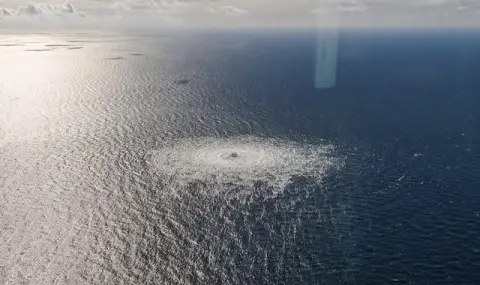The General Prosecutor's Office of Germany yesterday issued an arrest warrant for a Ukrainian diving instructor suspected of involvement in the Nord Stream gas pipeline explosions. and "Nord Stream 2". This comes nearly two years after a pipeline carrying Russian gas to Germany via the Baltic Sea was damaged in a series of explosions in Swedish and Danish waters in September 2022. The sabotage strained the already strained relations between the Russian Federation and Western allies and NATO to the extreme, and Ukraine has always denied complicity.
"Wall Street Journal" (WSJ) today published a detailed investigation into how Ukraine prepared to sabotage Nord Stream. The newspaper spoke to four senior Ukrainian defense and security officials who either participated in the plot or had access to direct information about it.
All of them are convinced that the pipelines are a legitimate target in Ukraine's defensive war against Russia.
According to the publication, the idea to sabotage the gas pipelines was born among several high-ranking Ukrainian military and businessmen "fueled by alcohol and patriotic fervor" in May 2022, months after the Russian army invaded Ukraine. The businessmen agreed to finance the operation. According to those who participated in it, its price was about 300,000 dollars.
The mission was led by an unnamed general with experience in special operations. At that time, he was subordinate to the Commander-in-Chief of the Armed Forces of Ukraine Valery Zaluzhny.
Vladimir Zelensky initially approved the plan (the publication emphasizes that all agreements were reached verbally). However, after Dutch military intelligence detected such a plan, it passed this data to the CIA. The CIA asked Zelensky to cancel the operation, who in turn ordered Zaluzhny. However, who ignored this order, and the original plan of operation was changed.
In comments to the WSJ, Zaluzhny said he knew nothing about the operation. At the same time, the newspaper notes that after Zaluzhny was removed from the post of commander-in-chief of Ukraine's armed forces, he was appointed ambassador to Great Britain, which gives him immunity from prosecution.
The general tasked with commanding the operation tapped Ukrainian special operations officers with experience in mounting high-risk covert missions against Russia to help coordinate the attack.
One of them is Roman Chervinsky, an award-winning colonel who previously served in Ukraine's main security and intelligence service, the SBU.
Chervinsky is currently on trial in Ukraine on unclear charges. After more than a year in custody, he was released on bail in July, but refused to comment on the "Nord Stream" case. - is not authorized to speak for him.
According to people familiar with the plot, Chervinsky and the sabotage team initially studied an older and more complex plan to blow up the pipeline, drawn up by Ukrainian intelligence and Western experts, even after Russia first invaded Ukraine in 2014.
p>
The recreational yacht "Andromeda" was used to carry out the operation to blow up the gas pipeline. There were six people on board the sailboat, a mix of seasoned active duty soldiers and civilians with seafaring experience, including a 30-year-old woman who had to create the camouflage that the gathering was a group of friends going on a pleasure cruise.
Witnesses from other yachts moored at Sandhamn noted that "Andromeda" was the only boat with a small Ukrainian flag raised on the mast.
"I always laugh when I read media speculation about some huge operation involving the Secret Service, submarines, drones and satellites," said one officer who was involved in the plot. "The whole thing was born out of a night of heavy drinking and the iron determination of a handful of men who had the courage to risk their lives for their country."
The four divers dived in pairs, according to people familiar with the German investigation. They used a powerful explosive known as HMX, which was linked to timer-controlled detonators.
A few days after the pipeline explosions, the CIA passed a signal from Dutch military intelligence to the German secret services. It provides details of the attack, including the type of boat used and the possible route the crew will take.
In addition, the saboteurs forgot to wash the yacht, which allowed German investigators to find traces of explosives, fingerprints and DNA samples of crew members.
Although the German investigation does not directly link President Zelensky to the covert operation, the findings could worsen relations between Kiev and Berlin, which provides much of Ukraine's funding and military equipment, second only to the US.
"An attack of this scale is reason enough to trigger NATO's collective defense clause, but our critical infrastructure was blown up by a country we support with massive arms shipments and billions in cash,'' says a senior German official
p>
Putin publicly blamed the US for the attacks. A senior Russian diplomat in Berlin echoed this claim and said the results of the German investigation were "fairy tales worthy of the Brothers Grimm".
In June, Germany's federal prosecutor quietly issued the first arrest warrant in the case of a Ukrainian diving instructor for his alleged involvement in the sabotage.
The German investigation is now focusing on Zaluzhny and his aides, people familiar with the investigation say, although they have no evidence that can be presented in court.
As a result of the attack, which took out three of the four pipelines that make up Nord Stream, energy prices soared. Germany and other nations fought to nationalize energy companies that processed Russian gas, but collapsed after the pipelines were destroyed. Even today, Germany pays about $1 million a day to lease floating liquefied natural gas, or LNG, terminals that only partially replace Russian Nord Stream gas.
